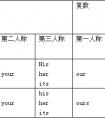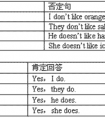句型转换,按括号内的要求转换下列句子,每空一词。1. She finds that it isn't easy to learn English. (同义句)She finds hard learn English. 2. He used to smoke -九年级英语
例如:Do you have any other questions?
the other作形容词或代词,特指两者中或两部分的另一个或另一部分。
例如:The bookshop is on the other side of the street.
others相当于“other+名词”,泛指“别的人或物”,只有名词性用法。
例如:Some are planting trees, others are watering them.
the others相当于“the other+名词”,表示“剩下的,其余的”,特指除此之外的全部 人或物。
例如:There are forty-six students in our class. Two of them are foreign, the others are all Chinese.
another作形容词或代词,泛指三个或三个以上不定数目中的“另一个”。
例如:This pen is too expensive, please show me another.
⑨either, neither
either指“两者中的任何一个”;neither指“两者中无一”,具有否定意义。
例如:You can take either half.
Neither of the books is good.
⑩many, much, most
many和much具有名词和形容词的性质,都表示“许多、大量”。
Much一般只能指代或修饰不可数名词,many只能指代或修饰复数可数名词。Most指“大部分、大多数”。
例如:Many boys like playing soccer.
We have much homework to do every day.
Most students think so.
(11)few, a few, little, a little
a few 和a little 意为“少数、少量”,其意义是肯定的。
A few指代或修饰复数形式的可数名词,a little指代或修饰不可数名词。
Few 和little意为“几乎一点没有”,具有否定意义。
例如:He has a few friends here.
Hurry up! There is little time left.
不定代词大都可以代替名词和形容词,在句中作主语、宾语、表语、定语和状语。
位置
不定代词+形容词
不定代词+to do
作主语
Both of them are teachers.他们两人都是教师。
作宾语
I know nothing about this person.我对这个人一无所知。
作表语
This book is too much for a child.这本书对一个小孩来说太难了。
作定语
There is a little water in the glass.玻璃杯里有一些水。
作状语
I can't find my book anywhere.我在任何地方都不能找到我的书。
修饰不定代词的词,一般情况下要后置。
考点名称:疑问代词
疑问代词:
疑问代词在句中起名词的作用,用来构成疑问句。常用的疑问代词有:
what, who, whose, whom, which, whatever, whichever, whoever, whomever
疑问代词在句中应位于谓语动词之前,没有词性和数的变化,除who之外也没有格的变化。
what, which, whose还可作限定词。
Whose books are these on the desk?
桌上的书是谁的?
What was the directional flow of U. S. territorial expansion?
美国的领土扩张是朝哪个方向的?
What events led to most of the east of the Mississippi River becoming part of the United States?
哪些事件使密西西比河以东的大部分土地归属于美国?
疑问代词在句中起名词词组的作用,用来构成疑问句。疑问代词有下列几个:
指 人: who, whom, whose
指 物: what
既可指人又可指物: which疑问代词说明:
一、无论是做疑问代词还是限定词,which 和 what 所指的范围不同。what所指的范围是无限的,而which则指在一定的范围内,例如:
Which girls do you like best?
你喜欢哪几个姑娘?
What girls do you like best?
你喜欢什么样的姑娘?二、Whom是who的宾格,在书面语中,它作动词宾语或介词宾语,在口语中作宾语时,可用who代替,但在介词后只能用whom, 例如:
Who(m) did you meet on the street?
你在街上遇到了谁?(作动词宾语)
Who(m) are you taking the book to?
你要把这书带给谁?(作介词宾语,置句首)
To whom did you speak on the campus?
你在校园里和谁讲话了?(作介词宾语,置介词 后,不能用who取代。)三、疑问代词用于对介词宾语提问时,过去的文体中介词和疑问代词通常一起放在句首,现代英语中,疑问代词在句首,介词在句未,例如:
For what do most people live and work?大部分人生活和工作的目的是什么?(旧文体)
What are you looking for?你在找什么?(现代英语)四、疑问代词还可引导名词性从句,例如:
I can't make out what he is driving at.
我不知道他用意何在。
Can you tell me whose is the blue shirt on the bed?
你能告诉我床上的蓝衬衣是谁的吗?
Much of what you say I agree with, but I cannot go all the way with you.
你说的我大部分同意,但并不完全赞同。- 疑问代词用法:
1. 疑问代词有who, whom, whose, which和what, 都是用来构成疑问句的:
Who is calling? 谁打电话来?
Whom do you want to speak to? 你想找谁接电话?
作主语时用who,作宾语时用whom,在口语中用who作宾语时也不少:
Who did you mean? 你指的是谁?
Who are you talking about? 你们在讲谁?
直接跟在介词后时只能用whom:
With whom did you come? 你和谁一道来的?
(口语中说“Who did you come with?时更多一些。)
2. 其他三个疑问代词可用作:
1)主语:
What’s your address? 你的地址怎样写?
Whose is better? 谁的好一些?
Which of these is yours? 哪一本是你的?
2)宾语:
What do you mean? 你是什么意思?
Which do you like better? 哪一个你更喜欢一些?
Whose have you chosen? 你选了谁的?
3)表语:
What’s her name? 她叫什么名字?
Whose is it? 这是谁的?
4)定语(这样用时有些字典标作形容词):
What time does the train leave? 这列火车什么时候离开?
Which room shall we stay in? 我们住哪间房?
Whose passport is this? 这是谁的护照?
考点名称:被动语态
- 语态:
是动词的一种形式,它表示主语和谓语的关系。
语态有两种:主动语态和被动语态。
如果主语是动作的执行者,或者是说动作是由主语完成的,要用主动语态;
如果主语是动作的承受者,或者是说动作不是由主语而是由其他人完成的,则用被动语态。 - 被动语态的构成:
被动语态的基本结构:
主语+be +过去分词(+by+动作的发出者)
① 一般现在时:am/is/are+过去分词
如:Trees are planted every year.
② 现在进行时 am/is/are+ being +过去分词
如:The road is being repaired.
③ 现在完成时 have/has + been +过去分词
如:The work has been finished.
④ 一般过去时 was/were + 过去分词
如:The story was told by him.
Many birds were killed last year.
⑤过去进行时 was/were+ being + 过去分词
如: The new house was being painted when I got home.
⑥过去完成时 had +been+ 过去分词
如: He told me that the work had been finished.
⑦一般将来时 will +be + 过去分词
如:The problem will be discussed tomorrow.
⑧ 过去将来时 would/should +be +过去分词
如: He said that the Christmas tree would be put up soon.
⑨情态动词的被动语态
情态动词+ be +过去分词
如:The problem must be solved soon.
Children should be taught to love animals. - 被动语态使用注意:
1. 不及物动词无被动语态。 如:happen, break down, come out......
What will happen in 100 years.
The dinosaurs disappeared about 65 million years ago.
2. 有些动词用主动形式表示被动意义。 如: write, sell, ride.....
This pen writes well.
This new book sells well.
3. 感官动词或使役动词使用省略to的动词不定式,主动语态中不带“to”,但变为被动语态时,须加上“to”。
例:make somebody do something→somebody+ be +made to do something
see somebody do something→somebody +be +seen to do something
A girl saw my wallet drop when she passed by.→My wallet was seen to drop by a girl when she passed by.
The boss made the little boy do heavy work.→The little boy was made to do heavy work by the boss.
4. 如果是接双宾语的动词改为被动语态时,直接宾语(物)作主语,那么动词后要用介词,这个介词是由与其搭配的动词决定。
He gave me a book.→A book was given to me by him.
He showed me a ticket.→A ticket was shown to me by him.
My father bought me a new bike. →A new bike was bought for me by my father.
5. 一些动词短语用于被动语态时,动词短语应当看作一个整体,而不能丢掉其中的介词或副词。
We can’t laugh at him. →He can’t be laughed at by us.
- 最新内容
- 相关内容
- 网友推荐
- 图文推荐
| [家长教育] 孩子为什么会和父母感情疏离? (2019-07-14) |
| [教师分享] 给远方姐姐的一封信 (2018-11-07) |
| [教师分享] 伸缩门 (2018-11-07) |
| [教师分享] 回家乡 (2018-11-07) |
| [教师分享] 是风味也是人间 (2018-11-07) |
| [教师分享] 一句格言的启示 (2018-11-07) |
| [教师分享] 无规矩不成方圆 (2018-11-07) |
| [教师分享] 第十届全国教育名家论坛有感(二) (2018-11-07) |
| [教师分享] 贪玩的小狗 (2018-11-07) |
| [教师分享] 未命名文章 (2018-11-07) |


![Sunday is my birthday. I would like _____ a birthday party, would you _____to my party? [ ]A. have; come B. to have; to come C. have; to come D. to have-七年级英语](http://www.00-edu.com/d/file/ks/4/2/budingshi/2020-01-08/smalla85122db0c71d7fb6ae58187be7f1fd11578430330.png)

![Why areyou here? You are supposed ______ in the classroom now. [ ] A. to studyB. to be studiedC. studying D. to be studying -九年级英语](http://www.00-edu.com/d/file/ks/4/2/budingshi/2020-01-08/small6dee02daa62cac1c71853ac804ab4fbd1578422460.png)
![She is very poor. Little food _____ and no room _____! [ ]A. to eat, to live B. to eat, to live in C. eating, living -八年级英语](http://www.00-edu.com/d/file/ks/4/2/budingshi/2020-01-09/small17b77c2697a3ef8f1461d0d14b016ee51578585185.png)
